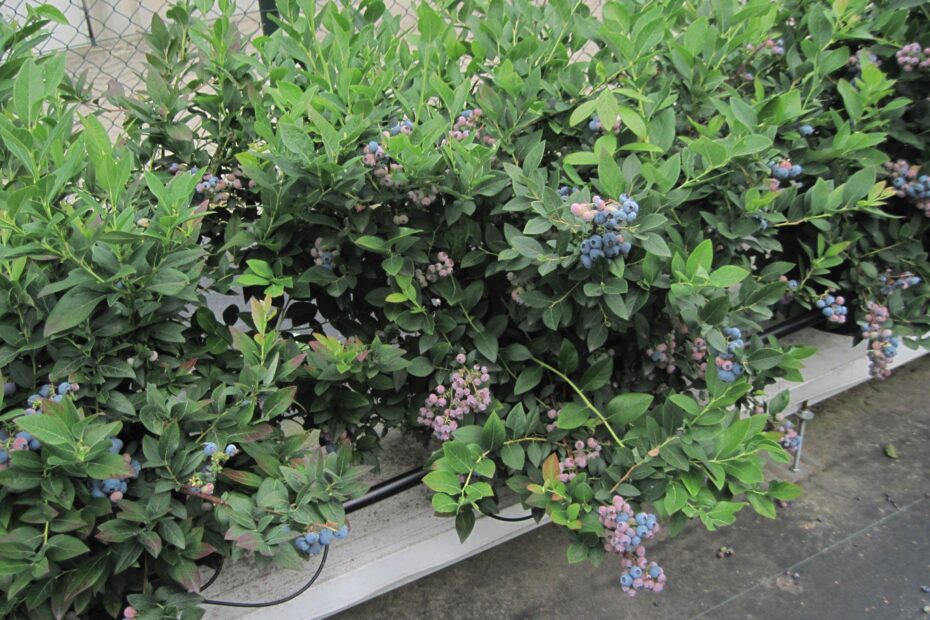Blueberry plants, scientifically known as Vaccinium corymbosum, are native to North America and belong to the Ericaceae family. These plants are deciduous shrubs that produce delicious and nutritious berries known as blueberries. Blueberries are packed with antioxidants, vitamins, and fiber, making them a popular choice for both fresh consumption and culinary use. Blueberry plants thrive in acidic, well-drained soil with plenty of sunlight.
Proper pruning and fertilization are essential for maintaining the health and productivity of blueberry plants. These plants can grow up to 6-8 feet in height and width, making them a great addition to home gardens or commercial farms. Blueberries are known for their sweet and slightly tart flavor, making them a versatile ingredient in various dishes such as pies, muffins, and salads. Blueberry plants typically start producing fruit within 2-3 years of planting, and with proper care, they can continue to bear fruit for up to 20 years or more. In addition to their culinary uses, blueberries are also celebrated for their health benefits, including improving heart health, aiding digestion, and boosting brain function. In conclusion, blueberry plants are a valuable addition to any garden or farm due to their delicious berries and numerous health benefits. By providing the proper care and conditions, blueberry plants can continue to thrive and produce bountiful harvests for years to come. Whether enjoyed fresh or incorporated into various recipes, blueberries are sure to delight taste buds with their vibrant color and exceptional flavor.They require consistent moisture, especially during the growing season, to produce high-quality berries..
Growing Blueberries: A Beginner’s Guide
Growing blueberries can be a rewarding experience for beginners looking to start their own fruit garden. Blueberries are a delicious and nutritious fruit that thrives in acidic soil with good drainage and full sun exposure. To begin growing blueberries, it is important to choose the right variety for your climate, such as highbush, lowbush, or rabbiteye blueberries. When planting blueberries, ensure proper spacing between bushes to allow for air circulation and prevent diseases. Blueberries require consistent watering, especially during the fruiting season, and adding mulch around the plants can help retain moisture and deter weeds. Regular pruning is essential to maintain plant health and encourage fruit production. To enhance yield and quality, consider adding fertilizer specifically formulated for acid-loving plants. Keep an eye out for pests and diseases that may affect blueberries, and address any issues promptly. With proper care and attention, you can enjoy a bountiful harvest of fresh, homegrown blueberries.
Discover the Power of Blueberry Plants: Nature’s Superfood Unveiled
Blueberries are not only delicious but also considered nature’s superfood due to their numerous health benefits. These small, vibrant fruits are packed with antioxidants, vitamins, and minerals that can improve overall well-being. Blueberry plants, scientifically known as Vaccinium corymbosum, are native to North America and have been cultivated for centuries for their excellent taste and health properties. One of the key benefits of blueberries is their high antioxidant content, particularly anthocyanins, which give them their deep blue color.
Additionally, blueberries are rich in vitamin C, vitamin K, and fiber, which support immune function, bone health, and digestive health, respectively. Studies have shown that consuming blueberries regularly can help improve cognitive function, heart health, and blood sugar levels. Whether eaten fresh, frozen, or in various dishes like smoothies, salads, or baked goods, blueberries are a versatile ingredient that can easily be incorporated into a balanced diet. So, next time you reach for a snack, consider adding some blueberries to your menu and unlock the power of nature’s superfood.Antioxidants help combat oxidative stress in the body, reducing the risk of chronic diseases and promoting healthy aging..
Blueberry Plant Varieties and Characteristics
| Aspect | Description |
|---|---|
| Scientific Name | Vaccinium corymbosum |
| Family | Ericaceae |
| Type | Perennial shrub |
| Height | 4-7 feet |
| Sun Exposure | Full sun to partial shade |
| Soil | Well-drained, acidic soil |
| Watering | Regular watering, especially during fruiting season |
| Harvest Time | Summer to early fall |
| Uses | Fresh eating, baking, jams, and jellies |
FAQ
Frequently Asked Questions About Blueberry Plants:

1. Q: When is the best time to plant blueberry bushes?
– A: The best time to plant blueberry bushes is in the early spring or late fall when the plants are dormant.
2. Q: How much sunlight do blueberry plants need?
– A: Blueberry plants thrive in full sun, so they need at least 6-8 hours of direct sunlight per day.
3. Q: Do blueberry plants need special soil to grow?
– A: Blueberry plants prefer acidic soil with a pH level between 4.5 and 5.5. You can amend your soil with peat moss or sulfur to lower the pH if needed.
4. Q: How often should I water my blueberry plants?
– A: Blueberry plants prefer moist, well-drained soil. Water them regularly, especially during dry periods, but be careful not to overwater as they don’t like sitting in waterlogged soil.
5. Q: Do I need to fertilize my blueberry plants?
– A: Blueberry plants benefit from regular fertilization with a fertilizer formulated for acid-loving plants. Apply fertilizer in early spring before new growth appears.
6. Q: How do I protect my blueberry plants from birds and pests?
– A: You can protect your blueberry plants from birds and pests by using netting to cover the bushes, setting up scare devices, or using organic pest control methods.
7. Q: When and how do I prune my blueberry plants?
– A: Prune your blueberry plants in late winter or early spring before new growth begins. Remove dead or damaged branches and thin out crowded growth to improve air circulation.
8. Q: How long does it take for blueberry plants to bear fruit?
– A: Blueberry plants typically start to produce fruit within 2-3 years after planting, with full production reached after about 6-8 years.
9. Q: Can blueberry plants grow in containers?
– A: Yes, blueberry plants can be grown in containers, but make sure to use a large container with good drainage and acidic potting mix. Container-grown blueberry plants may require more frequent watering and fertilizing.
10. Q: What are some common diseases that affect blueberry plants?
– A: Common diseases that can affect blueberry plants include powdery mildew, anthracnose, and root rot. Proper cultural practices, such as good air circulation and avoiding overhead watering, can help prevent these diseases.
- Cat Palm vs Majesty Palm: Which Should You Choose? - June 30, 2024
- Flowers That Survive Winter: Discover the Exceptional No. 5 - June 30, 2024
- The Ultimate Guide to the Growth and Care of the Black Pagoda Lipstick Plant - June 29, 2024


